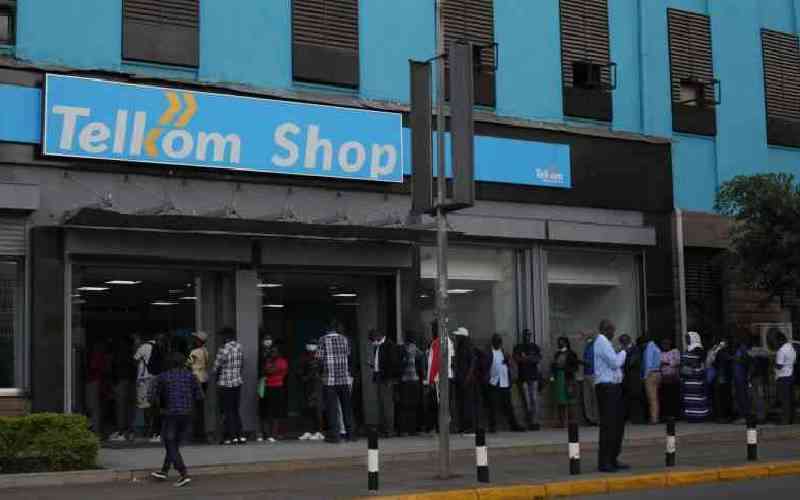
Once a monopoly in the country’s telecom sector, Telkom Kenya, has fallen to third place in Kenya’s competitive telecommunications sector, holding on to just seven per cent of the market.
Following France Telecom’s sale of the 70 per cent controlling stake it held in the firm to UK private equity firm Helios Investment partners, Telkom Kenya has been undergoing a turn around strategy to transform itself into a lean and competitive corporate machine.
“For years we have been referred to as a ‘sleeping giant’ and I think this is the time we get to show how much truth are in those words,” stated Telkom Kenya’s newly appointed Chief Technology Officer John Barorot.
Mr Barorot who has worked in similar capacities in Safaricom, Airtel and Equitel is just one of the several long-term industry talent that Helios has recruited to steer its turn around strategy.
The move comes at a time when competition between incumbent and incoming players is threatening margins.
“Today we have better ways of acquiring market data and we have technology that helps us map our users in terms of where they are spread out and what devices they are using which helps us understand better how to deploy our resources,” he explained. Deploying telecommunication infrastructure is an expensive undertaking for telecommunication service providers with costs of importing and maintaining network equipment often running into the billions each year.
“We are spending $50 million (Sh5 billion) on upgrading the network and we are strategically spreading this investment across 500 new base transmission stations,” explains Mr Barorot.
Mr Barorot says the firm is banking on infrastructure sharing agreements with other service providers including Safaricom and Eaton Towers who will host the new base stations. “
Ideally, this saves us costs because building base stations from scratch is costly since it involves identifying and buying land, waiting for the equipment to be imported and installed which takes time,” he explains.
The firm is also revamping its mobile money transfer platform to allow for integration with other third-party applications in a bid to build more functionality for users.
Currently, Kenya’s telecommunication service providers are in negotiations to set up an inter-operable mobile money platform as part of recommendations by a study commissioned by the industry regulator the Communications Authority of Kenya.
Setting up an interoperable mobile money platform similar to agreements in neighbouring Tanzania is anticipated to remove the costs associated with making transactions across networks.
This is further expected to improve user experience since operators will be more incentivized to provide a differentiated user experience. Telkom Kenya says it’s new mobile money network will be open to developers of third party applications which will drive innovation and generate more value for the firm and its subscribers.
“We realised that more developers are coming up with solutions that allow for more versatility which is good for our users,” Barorot explains. “Our system will be open source supporting more interoperability and allowing more value addition from third party developers.”
Stay informed. Subscribe to our newsletter
Mr Barorot observed that Telkom Kenya is also ramping up its data offering.
It is deploying its 4G LTE network on a pilot phase. The network is due for roll out in the next few months and Telkom is confident of growing its market share in the lucrative data market.
In the past two years, the number of Internet Service providers in Kenya has increased as more Kenyans get online and prices of devices continue to drop.
Data from the Kenya National Bureau of Statistics indicates that local bandwidth consumption has more than quadrupled in the last five years, from 264,426Mbps in 2012 to over 860,300Mbps last year.
This has had an impact on the bottom line of telecommunication service providers. Early this month, Safaricom published its financial results indicating that the average revenue per user on it’s SMS service has dropped to Sh51 from Sh58 recorded in the previous period.
This means that Safaricom lost roughly Sh181million from its 25.9 million subscribers in the last year alone owing to free chatting apps such as WhatsApp and Telegram. This money is however more than recouped through billing consumers on data they spend to access these sites with service providers investing more on high-speed networks
Research findings
“We are extending our 4G coverage in seven major towns where our research indicates many of our users reside and with the demand brought by over the top content distributors like Netflix and Showmax we believe there is a big opportunity in that space,” he explained.
The firm has also completed a partnership with Kenya Power to lay down a 400GBs fibre line running from Mombasa to Malaba that will allow Kenya to export data to Uganda.
After 100 years of being at the top of the industry Telkom Kenya was reduced to a shell of it’s former self in a few short years and is now struggling to catch up to newer, more nimble service providers.
Today, the firm is in the cusp of yet another turn around strategy. This time however, the market is more competitive, innovative and less patient and Bororot and his team face a daunting task in convincing consumers that it has shed its legacy of a lumbering loss-making parastatal- this time for good.
 The Standard Group Plc is a
multi-media organization with investments in media platforms spanning newspaper
print operations, television, radio broadcasting, digital and online services. The
Standard Group is recognized as a leading multi-media house in Kenya with a key
influence in matters of national and international interest.
The Standard Group Plc is a
multi-media organization with investments in media platforms spanning newspaper
print operations, television, radio broadcasting, digital and online services. The
Standard Group is recognized as a leading multi-media house in Kenya with a key
influence in matters of national and international interest.
 The Standard Group Plc is a
multi-media organization with investments in media platforms spanning newspaper
print operations, television, radio broadcasting, digital and online services. The
Standard Group is recognized as a leading multi-media house in Kenya with a key
influence in matters of national and international interest.
The Standard Group Plc is a
multi-media organization with investments in media platforms spanning newspaper
print operations, television, radio broadcasting, digital and online services. The
Standard Group is recognized as a leading multi-media house in Kenya with a key
influence in matters of national and international interest.









